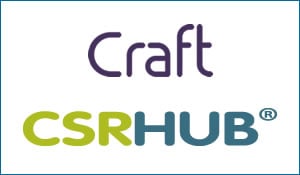This post was originally presented by CSRHUB COO and co-founder Cynthia Figge at the 2011 ISSP Portland conference, where she was a speaker. For a summary of the key trends emerging in CSR reporting, please scroll to the end of this article.
If you are doing sustainability work, your mission is nothing short of the transformation of the global economy. This is a confrontational time, when we are called on to translate old business language into new, honor the hard work of capitalism while fundamentally disrupting our prevailing business models, and bridge the divide of left and right, while speaking in ways that bring us together to a common purpose. It’s a journey that requires deep interweaving and skill.
My own sustainability journey began in 1995 when I read An Ecology of Commerce. The following year I cofounded the sustainability strategy firm, EKOS International, and traveled to Sweden to meet Karl-Henrik Robert, this year’s ISSP Hall of Fame inductee. I had the privilege of meeting John Holmberg, the physicist who developed the Four System Conditions of the Natural Step – the steps he determined were necessary to create a sustainable society. My partners and I returned to the U.S. quite certain that a great American business awakening was around the corner.
That was 15 years ago, but I’m still very hopeful. As Amory Lovins says, hope is a sense, not an assessment. In the late 90s EKOS created a now-iconic expression of sustainability – three overlapping circles representing the integration of the systems of ecological capital, human capital and economic capital. We dubbed businesses operating at this place of integration as ‘operating at the nexus,’ and we are still daring to imagine and working to build shared meaning around the idea.
In 2008 I cofounded CSRHUB to make transparent corporate progress in sustainability performance, accessible to everyone. We are a B Corporation, and over three years we have built a searchable database providing sustainability ratings and data on about 5,000 publicly traded companies in 65 countries. With five million data elements from 130 sources of information, we provide environment, employee, community and governance performance scores. We are capitalizing on the great trends of big dataset analysis, cloud hosting, social media connection, and personal passion.
We are in a period of discovery and invention, on the way to a sustainable economy. As consumers, managers, investors, government, and activists, we’re anxious to know how companies are doing.
Sustainability Data Demand
There are five broad groups of demand for sustainability data. First, socially responsible investing is a growing area. Traditional investors, including private equity firms, are also beginning to demand information not only on risk assessment, but the opportunity for upside and profit from sustainability. Activists and ardent consumers (enthusiasts) are increasing demand for information.
A friend’s 12-year-old daughter has stopped buying products from PINK, the Victoria’s Secret brand, because of their animal testing. She has at least a dozen search tools on her iTouch to screen products and companies for animal testing, organics, and other special issues. Corporate communications, PR, brand, IR, sustainability, EHS and supply chain managers are all in need of comparative data on their own company and their competitors’ performance.
There are many sources of data to meet the increasing need to know how companies are doing. The major categories include:
- Socially Responsible Investing (SRI aka ESG) Analysts and Indexes. SRI analysts include Asset4 (Thomson Reuters), GovernanceMetrics International, IW Financial, MSCI, Trucost, EIRIS, Sustainalytics, and Vigeo. They cover companies with median annual revenues around US $2.4 billion and 97% of the companies are developed or emerging economies. Indexes include the Dow Jones Sustainability Index (DJSI), Carbon Disclosure Leadership Index, the FTSE4Good Index Series, and the NASDAQ OMX CRD Global Sustainability Index.
- Standards Organizations. These include Underwriters’ Laboratories Environment (ULE), Global Impact Investing Rating System (GIIRS) – powered by the folks at B Lab, the Global Initiative for Sustainability Ratings (GISR) – promulgated by CERES and connected with GRI, the International Integrated Reporting Committee(IIRC), ISO, B Corp, Global Reporting Initiative (GRI), and Carbon Disclosure Project (CDP).
- Activists and Not For Profit (NFP0 Organizations, including Climate Counts, EPEAT, Burma Campaign, Oceana, Greenpeace, and Alex’s Guide.
- Crowd Based Sources: Glassdoor (covers 110,000 companies in 100 countries, and 3.5 million people visit per month) and Wikipositive (913 companies covered and 91 contributor research on corporate CSR).
- Product Level Sources: GoodGuide, and The Sustainability Consortium.
- Corporate Social Responsibility Reports: More than 3,000 companies worldwide now publish sustainability reports, including two-thirds of the Fortune Global 500.
The trend is clear – there is an ever-increasing demand for real time information about company sustainability performance. Hockey player Wayne Gretzky has described his strategy as skating to where the puck is going to be. Companies today can use that same metaphor to understand the sustainability ratings market, where the demand for information is moving rapidly – much like Gretzky’s puck – toward sustainability transparency. Reporting, companies will see the growing benefits of skating toward where the puck will be, and scoring in the sustainability department.
At CSRHUB we list 130 sources and, as a hub, link back to each of them. Each company profile in our database includes a list of the sources that rate that company. Since we started aggregating data in 2008, the number of available sources has nearly doubled.
The Disclosure Gap
Despite the demand for data, corporate CSR disclosure by individual companies remains uncommon and weak. According to Corporate Register (who has the best library in the world of these reports) only about 36% of the approximately 5,000 companies we follow at CSRHUB have now released one or more non-financial reports on their performance (only 20% for U.S. based companies). The percentage of smaller companies that provide CSR reports is dramatically less. A recently completed survey of the companies in CSRHUB’s database found that only about 55% have CSR-related websites, which we have incorporated into our company profiles on each company’s page on our website.
The UN Global Compact (UNGC), Global Reporting Initiative (GRI), and Carbon Disclosure Project (CDP), encourage companies to regularly report on a comprehensive set of well-defined metrics for their environment, social, governance (ESG) performance. U.S. participation in the UN Global Compact and Global Reporting Initiative (GRI) is also low, but growing. Forty-four percent of our approximately 5,000 companies make disclosures to the CDP, an exciting and positive indication of demand fueled by investors.
 Although CSRHUB is one of the largest databases of rated companies in the world, its ratings cover only a fraction of the global number of publicly traded companies and smaller private companies. Part of the problem is that investment analysts tend to focus on large companies. Seventy-one percent of SRI rated companies report revenues between $1-10 billion. So we need more self-reporting.
Although CSRHUB is one of the largest databases of rated companies in the world, its ratings cover only a fraction of the global number of publicly traded companies and smaller private companies. Part of the problem is that investment analysts tend to focus on large companies. Seventy-one percent of SRI rated companies report revenues between $1-10 billion. So we need more self-reporting.
Why Report?
If you are working with a public or private company or organization, there are important benefits of reporting. I have worked with a number of companies to help them publish their first environmental or sustainability report.. There is always some reluctance to disclose, a need to understand the benefits to the business, and uncertainty about what to disclose.
What companies find is that, if they report, stakeholders appreciate their willingness to begin to walk the road of transparency. And in order to report, companies set goals and are accountable for them. This may be the tail wagging the dog (reports spurring strategy), but it works. What is measured gets managed.
Once a company starts publicly reporting on its progress, the bar is raised and they must keep reporting (and performing). Witness the tremendous progress of Nike after many years of reporting on their sustainability work. Often reporting pre-empts regulations, and earns community support. Perhaps most importantly, employees of companies who are pursuing and reporting on their sustainability progress are proud and motivated. When we align our passion with our work, we develop more rapidly and we’re more engaged.

Following the de facto standard of GRI makes sense. In an analysis of all 5,000 of CSRHUB’s company scores, those who adhere to GRI standards score 5.5 points higher on average. Note that on a scale of 0 to 100, the highest performing companies are in the low 70s. So moving your company up 5 to 6 points on the CSRHUB scale is a significant performance improvement. We find the same correlation for companies that adhere to the UN Global Compact.
I encourage you to be advocates for disclosure and transparency. If you work with an organization – large or small, public or private – that has not yet reported its progress publicly, begin now, while reporting is voluntary. Integrate reporting with the prevailing management systems in your organization, identify key metrics, set concrete goals, and involve your finance department. Take advantage of the increasing pressure from investors. Tell your story with both numbers and stories – display passion. 10,000 publicly traded companies in the U.S, and hundreds of thousands of private organizations advocating for transparency in governance, environment, employee and community impact provide great leverage for change.
In Summary: Key Trends in Company CSR Reporting
- Increasing demand for information in real time about how companies are doing in sustainability.
- Emerging sources of information on all aspects of performance (treatment of employees and supply chain, environment and energy, community, and governance) from new expert ratings sources as well as crowd-sourced ratings.
- Multiplying advantages of increased transparency by companies.
- Leveraging disclosure by using standards such as GRI, UNGC, and CDP.
- Telling your story through CSR reporting.


